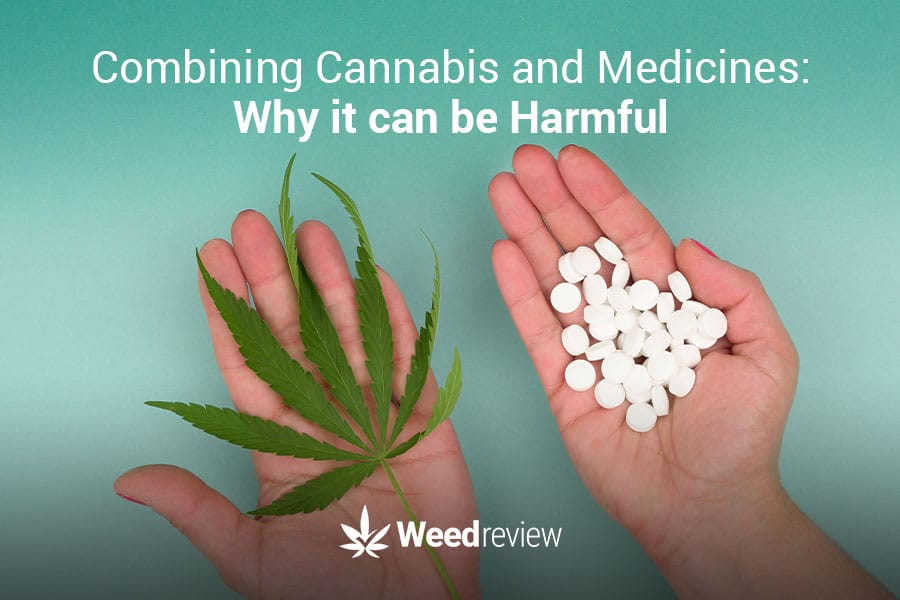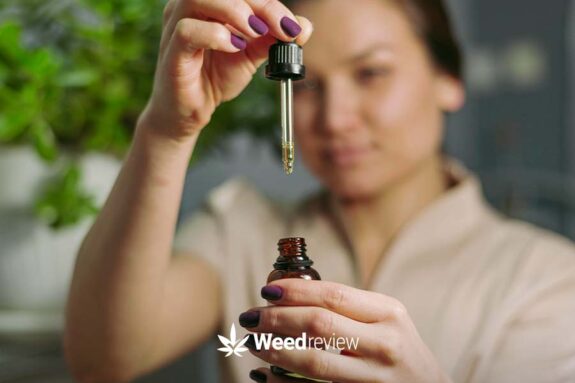
Cannabis & Medicines: Why Mixing Weed with Other Drugs can be Dangerous?

Table of Contents
Since medical marijuana is legal in Thailand, many are starting to take cannabis to treat their symptoms. A recent study shows 40% of Thai cannabis users take weed for medicinal reasons.
Here’s something to know: research shows that cannabis interacts with medicines, which may not be good for you. Even though it may be a holistic, natural remedy, it must be consumed wisely.
There is no cause for concern if you are taking only cannabis for something like pain or sleep. However, if you regularly mix weed with ibuprofen or other medications, your body may start responding badly.
Here is what you need to know about taking cannabis with other drugs. If you want to add cannabis to your healthcare routine, Weed Review recommends speaking to a doctor beforehand.
Cannabis drug interaction simplified
Simply put, medical interaction occurs when you take two or more conflicting medicines together. In many cases, it can do more harm than good for your body.
Cannabis is known to interact with several drugs and prescription medications and can potentially lead to many problems. THC (tetrahydrocannabinol) can interact with nearly 400 drugs, while CBD (cannabidiol) interacts with over 500.
The reason behind these interactions is the liver.
Liver enzymes belonging to the cytochrome P450s (CYPs) family and UDP-glucuronosyltransferases (UGTs) family are responsible for metabolising and eliminating more than 70% of common medications and marijuana taken by the body. This effectively means there is competition between weed and other drugs to be broken down by the liver.
When weed and medicines are taken together, either of the following situations is likely to occur:
- Cannabis compounds (THC & CBD) can inhibit/prevent the metabolism of the medicine. This causes the concentration of the medicine to increase in the system, leading to more effects or side effects.
- Cannabis can induce/promote the metabolism of the medicine. This causes the medicine concentration to decrease in the system, thus reducing/preventing the medicine from doing its job.
- In some cases, the concentration of cannabis chemicals can increase in the system.
Cannabis interactions with common medications
If you are a recreational toker who smokes weed only on the weekends or at parties, you don’t have to worry about these interactions.
Problems occur when chronic pot use is mixed with prescription medicines. As your system metabolises cannabis regularly, it interferes with the functioning of your routine medicines.
The symptoms also depend on how you take weed: smoking, vaping, oils, or edibles. Anything you consume orally will enter your system greatly, thus increasing the chances of dire interactions.

In such cases, it is advisable to stay off cannabis.
Alternatively, your doctor can adjust the dosage of your medicines for both to work in harmony – but this will require an honest discussion with them about your weed habits.
Smart cannabis use is vital here for a good experience; self-dosing is not recommended for medicines prescribed by your doctors.
Over-the-counter pain medicines
Over-the-counter pain medications like ibuprofen can increase the risk of liver damage when taken with marijuana regularly.
It may be due to THC & CBD slowing down the metabolism of the medicines, which leads to more of it in your system. This can be harmful to your liver and lead to increased toxicity.
Anti-anxiety medicines/benzodiazepines
Benzodiazepines are a class of prescription medicines used to treat anxiety, insomnia, and other health conditions. They are sedatives – they slow down the functioning of the body and brain. Common examples are alprazolam, lorazepam, clonazepam, diazepam, and temazepam.
Since cannabis is also a sedative that slows down the central nervous system, taking it with benzos can potentially increase the sedating effects (lower heart rate, increased drowsiness). This can make you very sleepy and prevent you from being productive.
Benzos are also addictive, and since weed has dependency tendencies, taking two together can put you on a slippery slope. In short, taking marijuana with depressants can be risky.
Anti-depressants
Cannabis has been shown to interact with psychiatric medications and antidepressants such as Lexapro, Zoloft, Prozac, Celexa, Wellbutrin, and Paxil. These drugs are prescribed for depression.
Taking these classes of medicines with marijuana can lead to:
- Increased anxiety, confusion & hallucination
- Medicines not working properly leading to side effects
- Increased heart rate
- Increased serotonin levels in the brain; anti-depressants and cannabis release serotonin in the brain. Too much serotonin can lead to Serotonin Syndrome, where the person can become disoriented, confused, restless, and agitated.
Blood thinners
Blood thinners like Warfarin are used to treat and prevent blood clots. Cannabis can prevent the metabolism of blood thinners in the system, thus leading to much higher levels and increased effects. This can cause excessive bleeding.
To be safe, do not smoke weed while taking prescription blood thinners.
What to remember
The bottom line is if you take marijuana regularly with prescription medicines, you should consult your doctor. Weed can interfere with how your body should process medications. It can either stop them from being effective or make them too powerful – neither situation is desirable.
There are plenty of medical marijuana clinics in Thailand with cannabis specialists who can help you find the right balance between the two.


